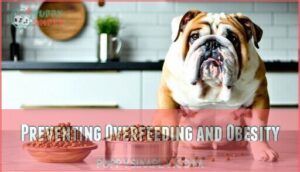This site is supported by our readers. We may earn a commission, at no cost to you, if you purchase through links.

Puppies will need to eat a bit more, about three or four small meals, to keep those little tails wagging. Skip random snacks and free-feeding—bulldogs are champion snackers but not known for self-control, so too much food can turn their waistline into a spare tire.
Keep meal times consistent and portions right for their age and activity. Hungry for more bite-sized feeding wisdom? There’s plenty of savory advice ahead.
Table Of Contents
Key Takeaways
- Feed your adult English Bulldog twice a day, spacing out meals in the morning and evening to prevent overeating.
- For puppies, offer 3–4 small meals daily to support steady growth and high energy needs.
- Avoid leaving food out or free-feeding, since bulldogs tend to overeat and can quickly gain unhealthy weight.
- Keep meal portions and times consistent, adjusting based on your dog’s age, activity, and any advice from your vet.
How Often Should English Bulldogs Eat?
You want your English Bulldog to have a happy belly and plenty of energy, so getting their meal schedule right is key. Let’s make sure your pup gets fed often enough—without turning them into a four-legged vacuum!
Puppy Feeding Frequency
When it comes to feeding English Bulldog puppies, setting a steady Puppy Feeding Schedule is key. Here are three essentials to keep your wrinkly pal happy:
- Offer 3–4 small meals to support Bulldog Puppy Nutrition and growth spurts.
- Prioritize hydration needs—always have fresh water.
- Stick to mealtime consistency to help prevent overfeeding. It’s important to make certain you’re providing high-quality puppy food.
Adult Feeding Schedule
Graduating from puppy chow? For adult Bulldogs, stick to two meals a day, spaced about twelve hours apart. Regular Meal Spacing and Schedule Consistency help keep digestive health on track and those puppy-dog eyes off your lunch. Watch their weight—activity impact plays a part in feeding amount.
Here’s a handy table for reference:
| Time | Food Type | Tips |
|---|---|---|
| Morning | Adult Food | Proper Feeding Techniques |
| Evening | Adult Food | Weight Monitoring |
| Daily | Fresh Water | Bulldog Digestive Health |
Senior Bulldog Meal Timing
Aging has its perks—you get to nap more and nobody questions it! For your senior bulldog, stick to two meals a day, but focus on calorie reduction, fiber increase, and joint support.
Reduced activity means extra calories add up quickly. Keep mealtimes steady, consider palliative care if needed, and tweak the English Bulldog diet as Bulldog Nutrition needs change.
Best Foods for English Bulldogs
Choosing the right food for your English Bulldog can feel like a tricky puzzle, but don’t worry—your pup’s dinner doesn’t have to be a mystery. Let’s clear up what’s best to put in their bowl, so you spend less time guessing and more time enjoying those famous bulldog snuggles.
High-Quality Protein Sources
Think of a winning Bulldog diet as a “protein-packed road trip.” High-quality protein is the fuel your English Bulldog needs. Aim for nutrient-rich ingredients and animal-based proteins (watch for chicken sensitivities).
- Beef or lamb
- Fish for omega-3s
- Protein percentages on labels
- Avoiding additives or fillers
Healthy protein, happy bulldog, fewer couch potato days!
Foods to Avoid
While excellent protein keeps your English Bulldog happy, keep an eye on what’s lurking in the bowl. Skip Toxic Ingredients and Allergenic Foods—these pack more drama than a soap opera.
Harmful Additives, Dangerous Treats, or People Food (hello, greasy table scraps) can invite Bulldog Health Issues, Bloat Risks, or worse.
Dog Diet Rules are simple: avoid risky extras!
Portion Sizes for English Bulldogs
Figuring out just how much chow your English Bulldog needs can feel like cracking a secret code, but it’s actually pretty simple once you know what to look for.
You’ll want to serve up portions based on your dog’s age and activity level—don’t worry, we promise it’s easier than convincing them to give up the couch!
Recommended Amounts by Age
Dial in your English Bulldog’s portion size at every life stage, and you’ll dodge those puppy-dog eyes after empty bowls. Here’s how to keep meals just right for Growth Stage Amounts:
- Puppy Calorie Needs: 1.5–2 cups of puppy food daily
- Adult Portion Control: 2–3 cups adult food split in two meals
- Senior Diet Adjustments: Slightly less to match slower days
Adjusting Portions for Activity Level
Once you know the right portion size for your Bulldog’s age, it’s time to factor in energy expenditure and daily exercise impact. More playtime means your English Bulldog may need extra bites, but don’t overdo it.
It’s also important to look at high-quality ingredients to promote overall wellness and longevity.
Stay sharp with portion control, watch for metabolism changes, and use activity monitoring—preventing overfeeding while building healthy eating habits keeps your pup in tip-top shape!
Preventing Overfeeding and Obesity
If you’ve ever caught your bulldog giving you “just one more bite” eyes, you know how easy it is to overfeed. Keeping meals on schedule and portioned right won’t just help their waistline—it’ll keep you both from running laps around the block!
Risks of Free-Feeding
You just read how portion sizes matter for your English Bulldog’s health, but letting food sit out all day (aka free-feeding) can open a can of worms. Watch out for:
- Sudden Weight Gain (hello, “bulldog bodybuilder”)
- Stomach Bloat Risk (no one wants a gassy pup)
- Food Aggression (protect that bowl)
- Spoiled Food—and stinky kisses!
Monitoring Body Condition
Picture your Bulldog as a squishy teddy bear—regular Visual Body Checks keep you honest. Use the Rib Palpation Guide and BCS Chart to gauge muscle mass and Weight Fluctuation Signs.
If those ribs vanish or bulges appear, you’re flirting with overfeeding and Bulldog Health Issues. Stay proactive—muscle mass assessment beats worrying about weight loss later!
Special Feeding Needs for Puppies
When you bring home an English Bulldog puppy, you’ll quickly realize these little munchkins have some very specific feeding needs. It’s all about making sure they grow up strong—without turning into walking marshmallows!
Puppy Growth and Nutrition
If you’re keeping a close eye on the scale to prevent overfeeding, here’s good news—Healthy puppy growth in English Bulldogs means regular check-ins with your Bulldog Puppy Feeding Chart. Puppy food with high-quality protein and nutrient-rich ingredients helps with growth milestones and prevents nutritional deficiencies.
Round out mealtime with vet-approved puppy supplements and breed-specific needs. Puppies keep you on your toes!
Transitioning to Adult Food
Puppies don’t stay little forever—just ask your chewed-up sneakers! When your English Bulldog starts acting less like a wild child and more like a mellow roommate, it’s time to think about a Food Adjustment Timeline.
Go slow with Gradual Food Introduction, keep an eye on Monitoring Stool Quality, watch for Allergy Considerations, and make any needed Nutritional Adjustments for adult food.
Tips for Healthy Bulldog Eating Habits
You want your bulldog to eat well, but sometimes those puppy eyes make it tough to say no to an extra treat.
Stick to smart habits and you’ll keep your furry friend healthy (and maybe a little less persuasive at the dinner table).
Consistent Feeding Routines
You’ve just set up your puppy’s feeding pattern—now keep that rhythm steady as your bulldog grows! A Healthy Meal Plan isn’t just about food, it’s about routine.
Give your English Bulldog Scheduled Meal Benefits like:
- Easier Digestive Health
- Predictable Routine Adjustments
- Fewer Consistency Challenges
- Positive Behavioral Impact
Remember, a happy bulldog loves snack o’clock!
Consulting Your Veterinarian
Regular routines make things easy, but don’t skip chatting with your vet. They know the ins and outs of English Bulldog health and can spot changes faster than you can say “snoring champion”.
Keep them in the loop for breed-specific advice, emergency situations, and custom dog nutrition guides—plus a little help with weight management or Bulldog health issues if needed.
Frequently Asked Questions (FAQs)
Can English Bulldogs be prone to food allergies or sensitivities?
Yes, English Bulldogs can be prone to food allergies and sensitivities.
So if your pup scratches, licks paws nonstop, or gets a grumbly tummy, you might need to play detective with different foods and treats.
What treats are safe for English bulldogs?
Better safe than sorry—pick treats like baby carrots, green beans, or apple slices (minus seeds). Steer clear of chocolate, grapes, or artificial sweeteners.
Remember, moderation’s the name of the game for your bulldog’s belly!
How does weather affect bulldog eating habits?
When it’s hot as a griddle outside, your bulldog may eat less—blame the panting.
Chilly weather can boost their appetite since their bodies burn more calories.
Trust your pup’s cues, not just the clock!
Are supplements necessary for English bulldogs’ health?
You don’t always need supplements for your English bulldog, but sometimes they’re helpful—like a little “vitamin boost.”
Think fish oil for itchy skin or joint support chews when stairs start looking taller!
How to handle food allergies in English bulldogs?
Spot your bulldog’s food allergies by watching for itchy skin, ear infections, or chronic tummy troubles.
Try switching to a simple diet, like salmon and rice, and introduce foods one at a time—patience pays off!
Conclusion
Funny how your bulldog’s eating habits can match your own—miss a meal, and you both get grumpy! With "bulldogs how often can an English Bulldog eat," sticking to a set schedule—twice daily for adults, more for pups—keeps them happy, healthy, and at their cutest.
Skip endless treats, keep portions in check, and don’t be shy about asking your vet for help. Happy bulldog, happy you—because everyone loves a wagging, satisfied tail!
- https://petsworld.in/blogs/news/bulldog-nutrition-complete-feeding-guide-for-bulldog-owners
- https://www.petmd.com/dog/breeds/bulldog
- https://iheartdogs.com/3-signs-your-bulldog-is-overweight/
- https://www.petplate.com/blog/diet-nutrition-guide-bulldogs/
- https://www.localvets.co.uk/what-to-feed-your-bulldog/













